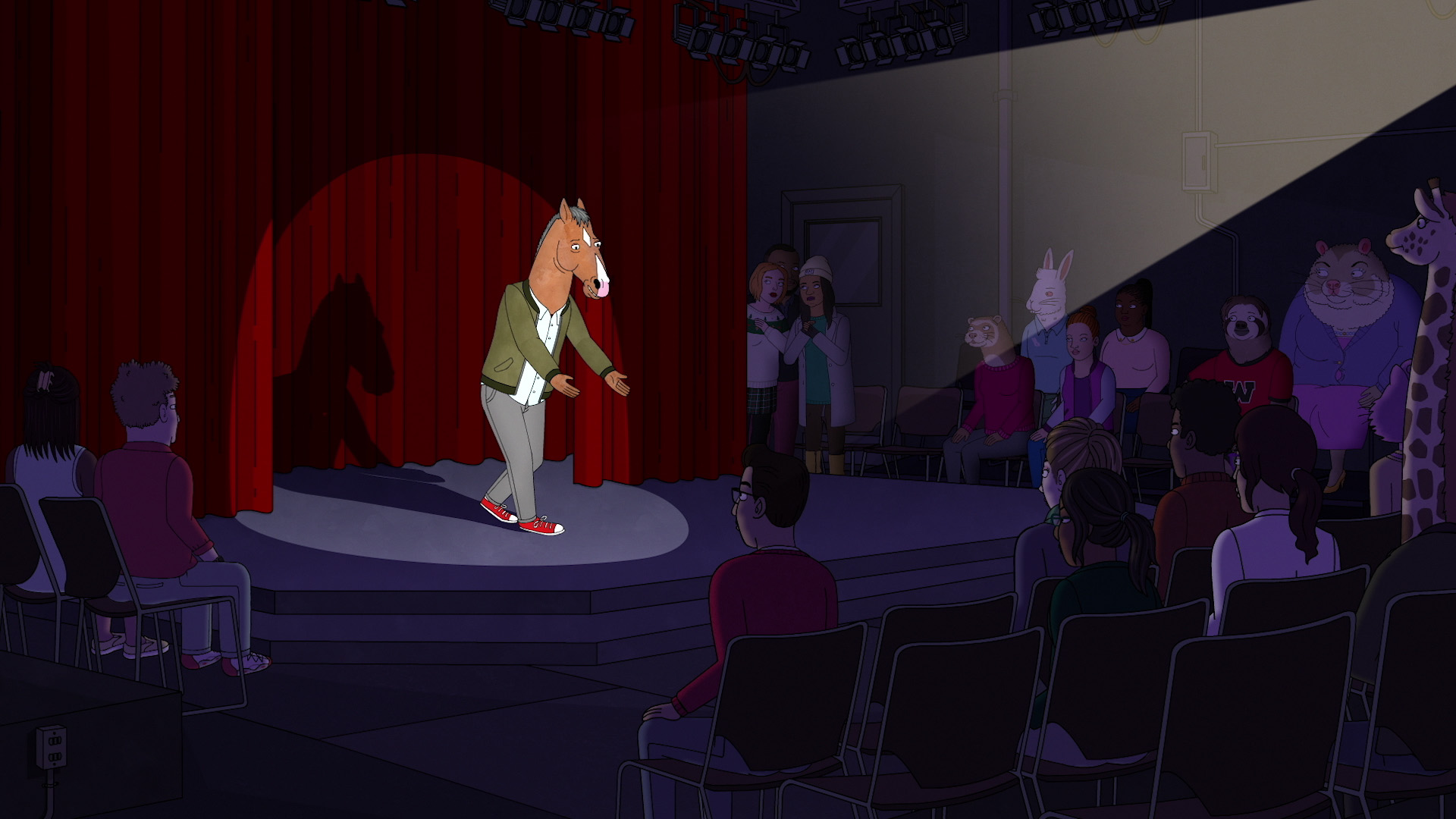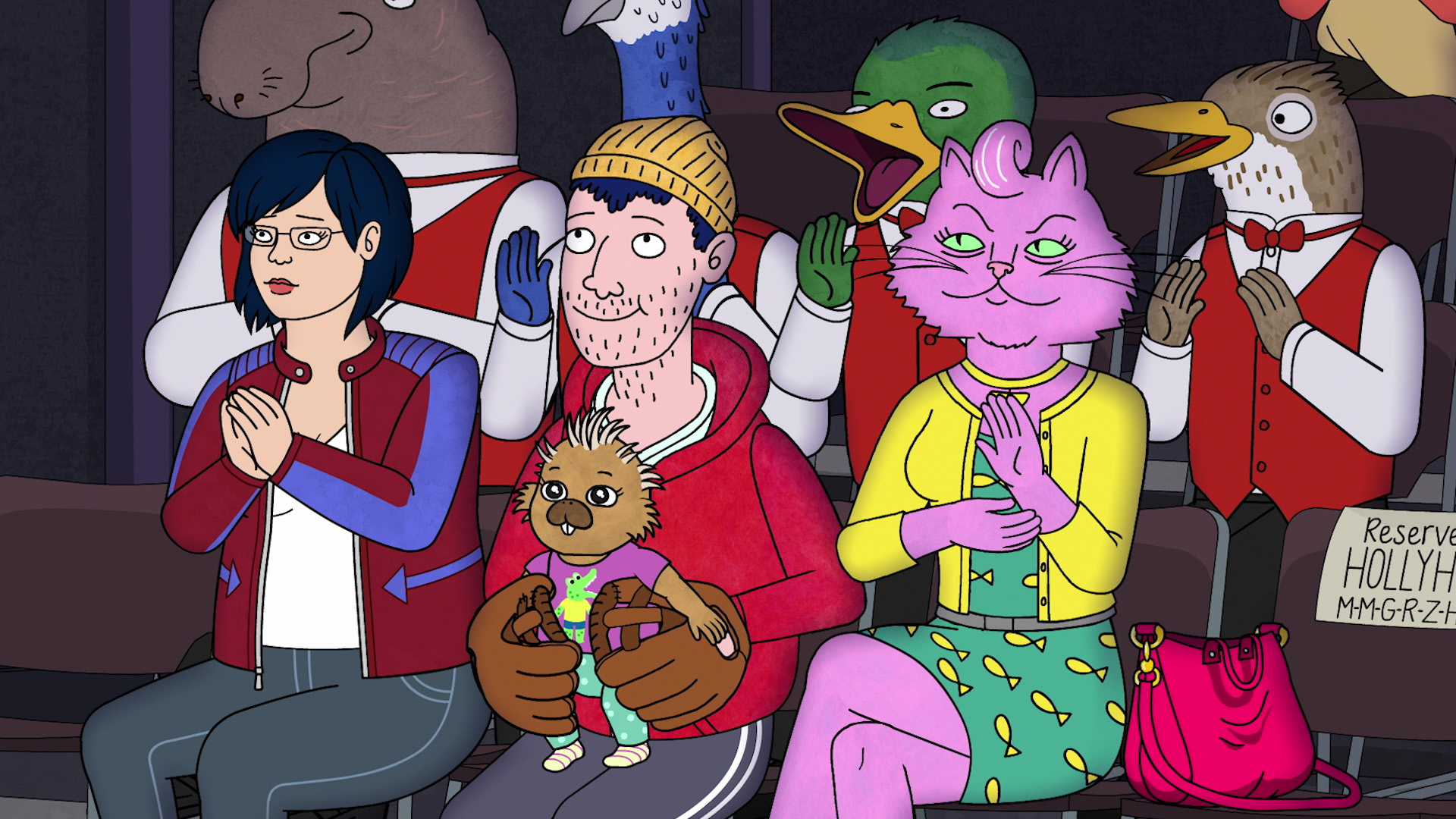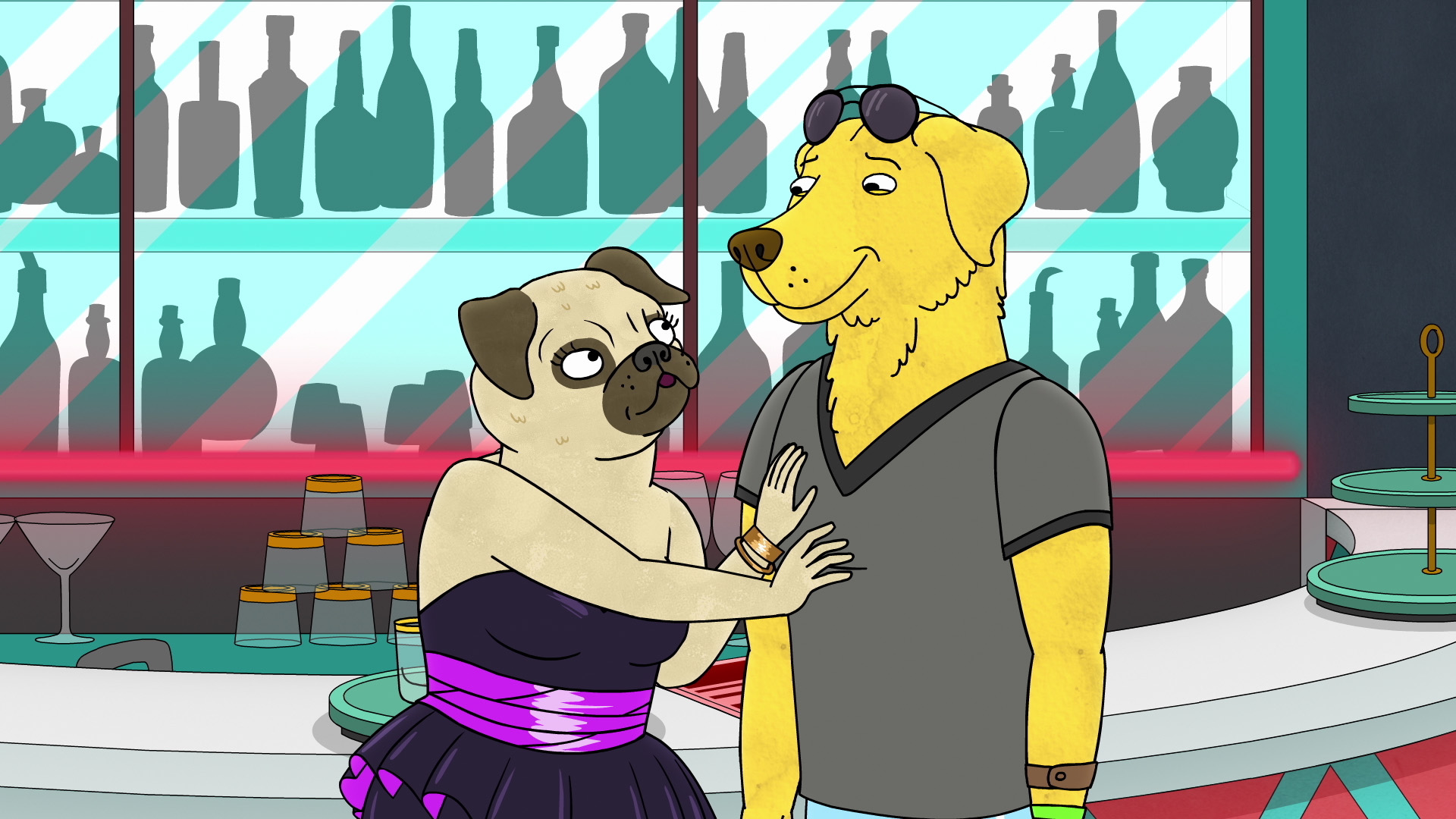
So, that’s it. After six seasons and a Christmas special, BoJack Horseman—the very best of the hundreds of series Netflix has churned out to date—ends with two old pals sitting on a rooftop, silently enjoying each other’s company, probably for the last time. A hallucination that unspools in the title character’s oxygen-deprived brain as he floats unconscious in the perfect L.A. pool he used to own, the show’s penultimate episode is certainly flashier than this conclusion. But the two feel like halves of a whole: In his dream, he confronts the ghosts of his dead friends and family. Then he wakes up and has to do it all over again with the people who are still alive.
Understated but extraordinary in its fidelity to the show’s mistrust of Hollywood endings, the finale begins with the same image it ends on: BoJack and his ghostwriter turned confidant Diane sitting together in the starry, matte-navy cartoon moonlight. (On my second viewing, I wondered whether this surreal circularity implied we were still trapped in our equine antihero’s drug-addled unconscious. Then I realized it didn’t really matter.) A montage that, like every narrative cliché BoJack appropriates, feels extremely aware of its artifice zooms through his discovery by the shocked family that bought his former home to his awakening in the hospital, trial and conviction on breaking-and-entering charges that are really a referendum on a multitude of post-fame sins.
The sequence is punctuated by glimpses of Horsin’ Around, the saccharine ’90s family sitcom that helped make BoJack the rich, narcissistic wreck he’s been for the past three decades. What we see playing on the TV in his old house is, in fact, a clip from that off-brand Full House’s own finale—in which his character, a horse who adopts three human orphans, dies of a broken heart because those adorable kids never appreciated him enough. Macabre though it may be, this ending is an example of the false sense of closure we rely on television to provide. And, like BoJack’s afterlife hallucination, it suggests that the only real conclusion to any person’s story is death.
The clip is also one callback among many in the finale to BoJack’s own premiere, which includes the Horsin’ Around death scene and opens with the intoxicated star sitting for a messily profound interview with Charlie Rose. (That Rose would fall from grace years after the episode debuted, amid multiple accusations of sexual misconduct, only reinforces the show’s built-in wariness toward the famous, powerful men we put on pedestals.) “For a lot of people, life is just one long kick in the urethra,” BoJack tells the host, by way of defending Horsin’ Around—which he’s been watching compulsively as he spirals into addiction and depression. “And sometimes, when you get home from a long day of getting kicked in the urethra, you just want to watch a show about good, likable people who love each other—where, you know, no matter what happens, at the end of 30 minutes everything’s gonna turn out OK.”

BoJack is, among other things, first-time TV creator Raphael Bob-Waksberg’s experiment in subverting that formula—in using half-hour episodes to challenge the assumption that the artificial comfort we derive from sitcom clichés is in any way benign. It’s certainly not the only great, unorthodox dramedy to emerge in recent years (see: Atlanta, Better Things, Fleabag, Barry). But it is the one most interested in deconstructing its own format, which sows complacency and dissatisfaction with the imperfect lives we all lead. Each season has found BoJack making catastrophic mistakes, wallowing in subsequent self-hatred and self-pity, gaining crucial insight about himself, striving to be better and then backsliding, badly—because understanding one’s own failings isn’t the same as having the will to make lasting change.
While none of them is a BoJack-level recidivist, the friends who’ve helped to prop him up over the years have self-sabotaging patterns of their own. His agent and ex-girlfriend Princess Carolyn is a workaholic, prone to putting business and the expectations of others ahead of her personal life and creative goals. Diane drifts precariously between jobs and relationships, searching for an outlet and a place to belong but mistrustful of her own instincts. Todd—the zany post-adolescent whom BoJack once essentially adopted in a roommate situation that resembled a sad parody of Horsin’ Around—can’t grow up. Even Mr. Peanutbutter, the simple, lovable Labrador Retriever frenemy to BoJack’s miserablist horse, is an inveterate people-pleaser.
Each character’s cycle works for as long as Bob-Waksberg and his team keep making new episodes. In fact, you could imagine him stretching out BoJack into one of those never-ending animated social satires, like The Simpsons or South Park. But, true to the show’s no-easy-answers approach, he took on the harder task of bringing it to an authentic conclusion.
That conclusion unfolds, at last, on Princess Carolyn’s wedding day. Mr. Peanutbutter fetches his old buddy from the clink, kicking off the series of one-on-one conversations of escalating gravity that comprise the finale. BoJack’s chats with Mr. Peanutbutter and Todd yield no shortage of goofy yet astute revelations. “Are my self-destructive patterns and unexamined cycles of codependency the popular Jim Carrey character The Mask? Because ‘somebody stop me!’” the Lab reflects. Todd offers a close reading of The Hokey Pokey: “You turn yourself around. That’s what it’s all about.”
In one last dance with Princess Carolyn, BoJack—who was terrified he’d ruin her nuptials with some splashy, sitcom-y, last-minute outburst—finds out that this isn’t even her real wedding, just a party for industry contacts. She’s already married. After decades of loving him and cleaning up his messes, she’s finally learned to keep him at arm’s length. She has a husband now, as well as the baby she spent years begging him to have with her. Even continuing to work with BoJack could put all that in jeopardy.

His last conversation, on the roof with Diane, is the hardest to watch. She’s the character who’s always had the most in common with BoJack, from the bleak childhood to the depressive tendencies—and the person he phoned in desperation on the night he almost drowned. Guilt over her failure to save him nearly sent her down a self-destructive spiral of her own. Instead, she sought happiness by moving to Houston, marrying the boyfriend with whom she’s formed a healthy relationship and writing the middle-grade “mall detective” novels that make her feel better than wallowing in old trauma. It’s clear she now sees BoJack as a holdover from a darker phase that has ended and has no abiding need to continue the friendship.
It’s taken years, but Diane and Princess Carolyn have both reached the same bittersweet conclusion: they can’t build their lives around the roller-coaster of suffering and redemption that is BoJack Horseman, though they continue to care about him. There have been moments in the show when it seemed that he was destined to end up with one of these women or the other. But that wouldn’t just be too easy; it would be a happy ending BoJack still hadn’t earned after all the pain he put them and others through. A third woman he loves, his kid sister Hollyhock, doesn’t even show up in the finale. When she found out about BoJack’s role in the death of his Horsin’ Around co-star Sarah Lynn, another little-sister figure in his life, he lost her—maybe forever.
So everyone gets a happy ending except for BoJack, who is only furloughed for the wedding and will have to go back to prison immediately afterward. His empathy, generosity, sobriety, self-awareness and the new sense of purpose he’s found in working with his fellow prisoners will all surely be tested once he’s really free. That doesn’t mean he’s doomed (or that his friends’ more encouraging fates are sealed, for that matter). He’s just going to have to start making tough decisions again, with fewer patient and/or masochistic people around to absorb the consequences for him.
Existentialism, the belief that free will and the lack of an absolute morality dictated from on high endow each person with the ultimate responsibility for how we spend our time on Earth, has always been the core philosophy of BoJack Horseman. In Bob-Waksberg’s anti-sitcom world, life is only what you make it—and, as the show’s second-to-last episode reiterates, no divine reward or punishment will come along to pronounce that life a success or a failure, or to otherwise force meaning out of it. BoJack is Camus’ Sisyphus, pushing a rock up a hill only to have it roll back to the bottom again. And the rock he’s pushing, which threatens to crush him, keeps getting heavier because it bears the weight of all the destruction he’s wrought. Still, when the alternative is the nothingness of death, it’s not such a sad image.
More Must-Reads from TIME
- Why Trump’s Message Worked on Latino Men
- What Trump’s Win Could Mean for Housing
- The 100 Must-Read Books of 2024
- Sleep Doctors Share the 1 Tip That’s Changed Their Lives
- Column: Let’s Bring Back Romance
- What It’s Like to Have Long COVID As a Kid
- FX’s Say Nothing Is the Must-Watch Political Thriller of 2024
- Merle Bombardieri Is Helping People Make the Baby Decision
Contact us at letters@time.com